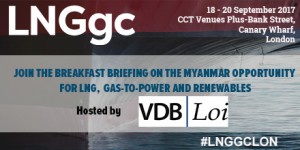Myanmar: a blooming, new, lucrative LNG market for foreign investments

The newly elected democratic Government of Myanmar has lifted all the restrictions on foreign access to the electricity sector in the country. This means that foreign companies may own up to 100% of all types of electricity generation, as well as transmission and distribution, making Myanmar a lucrative market for expanding energy suppliers, especially LNG.
Last year, the International Growth Centre (IGC) stressed that continuous and reliable access to energy has a central role in Myanmar’s industrial development. In light of this, Myanmar’s five Power Purchase Agreements involved five foreign sponsors: Sembcorp, Green Earth Power, ACO, Andaman Power &Utility, and UREC Energy.
“Foreign ventures are particularly useful for Myanmar’s energy market, in respect of providing funding that may not be available within Myanmar, and also providing technical capacity and project experience on the large scale, which is difficult to be met solely by local companies”, said Edwin Vanderbruggen, senior partner at law and tax advisory firm VDB-Loi.
Vanderbruggen will be speaking about the opportunities in Myanmar at LNGgc London. Book now!
Myanmar’s energy poverty is unquestionable. According to IGC, per capita electricity consumption in Myanmar was around 150-160 kWh last year, barely enough to power a 60 watt lightbulb for 6 hours per day for a full year! However, with the right investors, the energy developments in Myanmar could potentially result in an electricity consumption growth of 13.5%, equal to Vietnam’s growth over the past two decades.
“There is a variety of reasons for Myanmar’s energy shortage”, Vanderbruggen explains. “However, much of the country’s energy resources, such as gas, have been sold to neighbouring countries, which has been a substantial contributor.”
In a country where 70% of the population still has no access to electricity, it is imperative for the Government of Myanmar to secure country-wide access to energy.
“To meet the demand for electrification in the country, the Government is supporting investment into the energy sector, through the development of the legal framework, and working in conjunction with groups such as International Finance Corporation to develop strategy and feasible solutions.”
IGC observed a significant difference between the electrification rate of Yangon, the capital of Myanmar, and rural areas, which last year stood only at a 16% electrification rate compared to the capital’s 80%. To even out the gap between the capital and the rural areas, the Government of Myanmar is looking for investments in “hydro, gas, and solar” energy sources.
However, there is a particular interest in liquefied natural gas.
“This is evidenced by the Government currently working on the LNG licensing process and perfecting the final draft of the Petroleum Products Bill. Furthermore, in September of 2016, the Ministry of Electricity and Energy announced a tender for the development of an LNG business in Myanmar”, Vanderbruggen says.
“We understand that this interest in LNG from the Government comes from declining gas reserves, particularly given that the current exploration of additional reserves will not come online for some time. To satisfy the demand for gas in the interim, the Government believes LNG is a suitable ‘bridge solution’.”
However, a Myanmar venture needs careful consideration, as the geographical landscape of the country is widely varied. There are many mountainous states, like Kachin and Shan, while the other end of the country is abundant in beaches, like in Mon and Tanintharyi sates.
“The solution will inevitably have to involve more hydro power projects in remote areas which are not connected to the national grid, more private investments and the enhancement of national distribution technology.”
A new LNG venture in Myanmar is not without difficulties, but the opportunities for growth and ROI are plentiful.
 Speaking at our LNG Global Congress, Vanderbruggen will go into further detail in the specifics of the new governmental decision to lift all restrictions on foreign access.
Speaking at our LNG Global Congress, Vanderbruggen will go into further detail in the specifics of the new governmental decision to lift all restrictions on foreign access.
The highlights of this practical briefing will include an overview of the Government’s planned LNG tender, a demonstration of on-going LNG projects, an explanation of the new opportunities enabled by the lifted ban, and the technicalities of operating in Myanmar.
Book your tickets now for LNGgc, and don’t miss out on this opportunity.